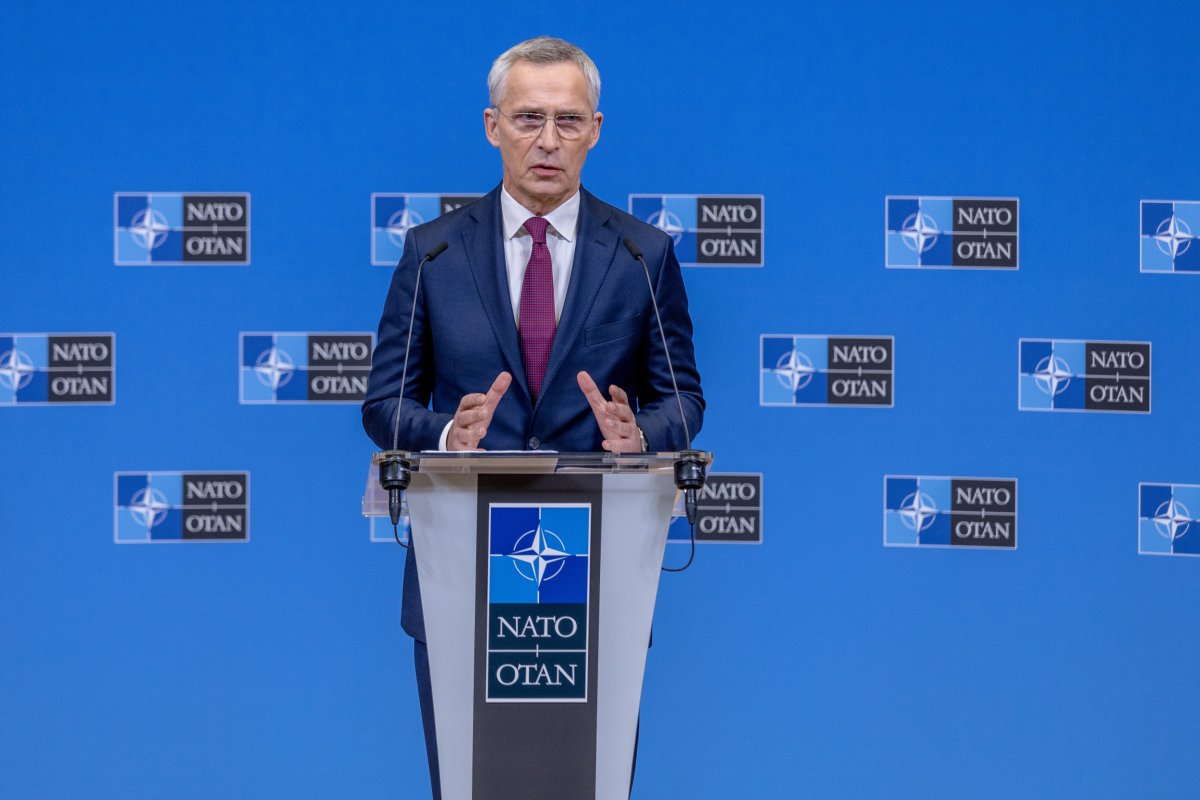NATO General Secretary Jens Stoltenberg recently said victories for Russian President Vladimir Putin in Ukraine would be "dangerous" for NATO and Western countries as the Russia-Ukraine war continues.
Putin launched his invasion of Ukraine in February 2022, claiming to seek the "denazification" of the Eastern European country's government and hoping for a quick victory. Nearly two years later, Ukraine's stronger-than-anticipated defense effort has blocked Russian advances, and both sides continue fighting for control of eastern Ukrainian territory.
In an interview clip with Germany's ARD broadcast channel that was posted Sunday to X, formerly Twitter, by Anton Gerashchenko, an adviser to Ukraine's minister of internal affairs, Stoltenberg warned that "we have to be prepared for bad news as well. Wars are phased, but we have to stand with Ukraine in both good times and bad."
He added: "The one thing we do know is that the more we support Ukraine, the faster this war will end. We must realize that a victory for President Putin would be a tragedy for Ukraine, but it would also be dangerous for us. It is in our own interest to make everything possible for Ukraine to win."

Stoltenberg reiterated the alliance's support for Ukraine during a call with transatlantic leaders in October, which included President Joe Biden. According to a press release from NATO, allied members are sharing the burden of supporting Ukraine "equitably," with around half of the military support for Kyiv coming from the United States and the other half being sent from European members and Canada.
During his interview with Germany's ARD, Stoltenberg said that while "little has changed" on the war's front in recent months, Ukraine's ability to keep the Black Sea's shipping lanes open for grain transport is substantial in this "war of attrition."
"The Ukrainians have been able to inflict heavy losses on Russian forces by attacking with missiles deep behind the front lines, destroying airplanes and helicopters and pushing the Russian Black Sea Fleet into the eastern Black Sea," he said. "That means they will now be able to keep the sea lane open for ships carrying grain from Ukraine through the Black Sea. So, these are big victories, even if they haven't been able to advance on the front lines."
Newsweek reached out to a NATO spokesperson via email for additional comment.
NATO General Secretary @jensstoltenberg: we must be ready for bad news, too. This is a war of attrition, battle for effectiveness, battle for logistics. Increasing ammunition production plays a decisive role. The more we support Ukraine, the sooner this war will end.
— Anton Gerashchenko (@Gerashchenko_en) December 3, 2023
We must… pic.twitter.com/oGdRZsRw73
Stoltenberg said, while it is difficult to plan wars, increasing munitions is tantamount. He said fragmentation within the European defense industry must be solved to ensure the demand is met.
"Boosting munitions production is critical. We are working hard to make it happen. We are not working together as closely as we should," h said. "I don't want to point the finger at anybody, but I think we need to realize that we are talking about the interests of Europe, and that is good for jobs in the industry. We must not let the increased demand for ammunition lead to higher ammunition prices. We need to increase the supply."
In a Thursday interview with the Associated Press, Ukrainian President Volodymyr Zelensky said the war is in a new stage, with winter expected to complicate fighting. This summer, Zelensky said a counteroffensive failed to produce desired results due to shortages of weapons and ground forces.
Despite the obstacles, Zelensky said Ukraine's forces won't give up.
"We have a new phase of war, and that is a fact," he told the AP. "Winter is a whole is a new phase of war."
Uncommon Knowledge
Newsweek is committed to challenging conventional wisdom and finding connections in the search for common ground.
Newsweek is committed to challenging conventional wisdom and finding connections in the search for common ground.
About the writer
Gabe Whisnant is Deputy Weekend Editor at Newsweek based in South Carolina. Prior to joining Newsweek in 2023, he directed ... Read more





